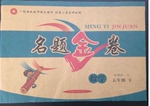题目内容
Everytime I_______a foreigner, I will seize the opportunity to practise my spoken English
- A.believe in
- B.turn around
- C.come across
- D.see off
C
短语辨析。 A. 信仰;信任 B. 转身 C. 偶遇 D.送行。句意:每一次我偶然遇到一位外国人,我都会抓住机会练习我的口语。故选C。
短语辨析。 A. 信仰;信任 B. 转身 C. 偶遇 D.送行。句意:每一次我偶然遇到一位外国人,我都会抓住机会练习我的口语。故选C。

练习册系列答案
 名题金卷系列答案
名题金卷系列答案 优加精卷系列答案
优加精卷系列答案
相关题目